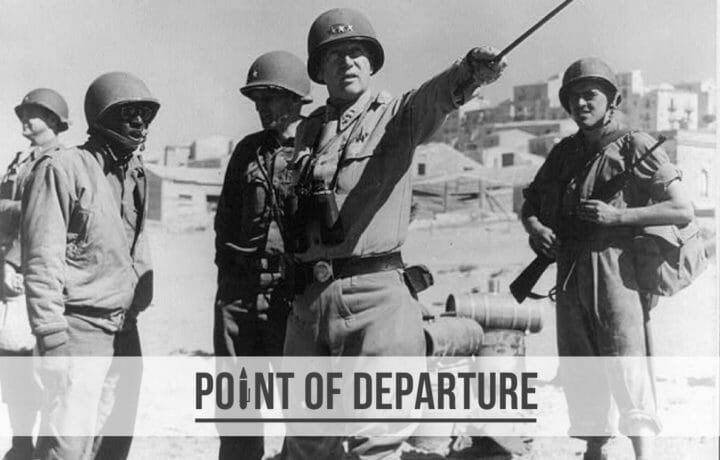General George S. Patton was nothing if not controversial. Long considered one of the most colorful commanders of the Second World War, he spent nearly as much time with his career hanging in the balance as he did fighting the enemy. He was a maverick thinker, a pioneering innovator who extolled the virtues of armor in battle when many of his peers (and superiors) were still convinced that mounted horse cavalry was the only way to conduct maneuver warfare. A protégé of Fox Connor, the influential leader behind the success of George C. Marshall and Dwight D. Eisenhower, Patton was a brilliant historian and operational mastermind. Third Army’s sweep across France defied the conventional wisdom of the time, and his relief of Bastogne during the Battle of the Bulge remains the stuff of legend. He was, simply put, the embodiment of a combat commander in World War II.
Ego, Controversy and Quotes: Patton Had it All
He also possessed a raging ego, a heightened sense of self-grandeur that haunted him throughout the war. When he wasn’t in the thick of the fight, he could be petulant to the point of distraction, creating one headache after another for Eisenhower (who was already dealing with enough egos to exhaust the most resilient supreme commander). One controversy after another dogged Patton throughout the war; every significant success was followed soon after by an equally significant faux pas. As Eisenhower wrote after relieving him in August 1943, “I must so seriously question your good judgment and your self-discipline as to raise serious doubts in my mind as to your future usefulness.”
Patton, however, was consistent in two distinct ways. One, he always bounced back, and in a form and manner that was inevitably spectacular. Two, good or bad, he could always be counted on for a memorable quote. He had a remarkable way with words. So much so, that over 75 years after his death, he remains one of the most quotable military leaders in history.
Of those quotes, some stand out more than others. Some of the best quotes—or their Hollywood adaptations—are enshrined in Francis Ford Coppola’s Oscar-winning screenplay for Patton’s eponymous biographical film (the soundtrack to which is playing along in the background as I write). Which of Patton’s maxims are the most meaningful varies by personal taste and experience. Someone who values perseverance might seize on, “You are not beaten until you admit it.” A person who favors boldness will likely lean toward, “Do your duty as you see it, and damn the consequences.” While someone with a flair for the irony of war might point to, “The object of war is not to die for your country but to make the other bastard die for his.” It’s generally a good bet that if you’re looking for an apropos quote about war or warfare, Patton said something that will suit your needs.
Top 10 Patton Quotes
My top ten have personal meaning to me, touching on various aspects of my personality, experiences, or perspective on life. Some are specific; some are general. And some, like Patton himself, are likely controversial.
1. “A good plan, violently executed now, is better than a perfect plan next week.”
Perfect is the enemy of good enough. If I think I’ve reached a 90% solution, that’s good enough. I know I can adapt on the fly.
2. “Moral courage is the most valuable and usually the most absent characteristic in men.”
Some words speak for themselves. This quote is for all those who choose the easy wrong over the hard right. They know who they are.
3. “One makes plans to fit the circumstances and does not try to create circumstances to fit plans.”
Simply put, the enemy gets a vote. So does the situation. So do the terrain and weather. With that in mind…
4. “Success in war depends on the Golden Rules of War: speed, simplicity, and boldness.”
It’s as basic a formula as you’ll find. Speed, not haste. Simplicity built on fundamentals. And boldness rooted in a willingness to embrace risk and create opportunity.
5. “A pint of sweat will save a gallon of blood.”
Tough, realistic training that taxes the mind and body equally will set the foundation for success in combat. Hard training builds mental and physical “muscle memory” that pays dividends when exhaustion sets in.
6. “Lead me, follow me, or get out of my way.”
Indecisiveness kills. Command is not for the faint of heart. If you can’t lead and make decisions, then make way for those who can.
7. “Say what you mean and mean what you say.”
Don’t mince words. Speak your mind and stand behind your words. You won’t always be right and you won’t always change minds, but if you speak the truth as you believe it, you’ll always have your self-respect.
8. “Do everything you ask of those you command” and “Do more than is required of you.”
These two maxims go hand-in-glove. They are fundamental to effective leadership and underpin leading by example.
9. “If everybody is thinking alike, then somebody isn’t thinking.”
To paraphrase Mark Twain, if you surround yourself with people who think like you, they will drag you down to their level and beat you with experience. Don’t let your ego get in the way of allowing divergent thinkers in the room with you. You need them. They will save you from yourself (and the “yes men” around you).
10. “No good decision was ever made in a swivel chair.”
Never make a decision in a vacuum. Get up, get out, and get moving. Circulate so you have a sense for what’s happening outside your command tent (or your office). Talk to people. Then make the best decision possible with the information available to you at the time.




